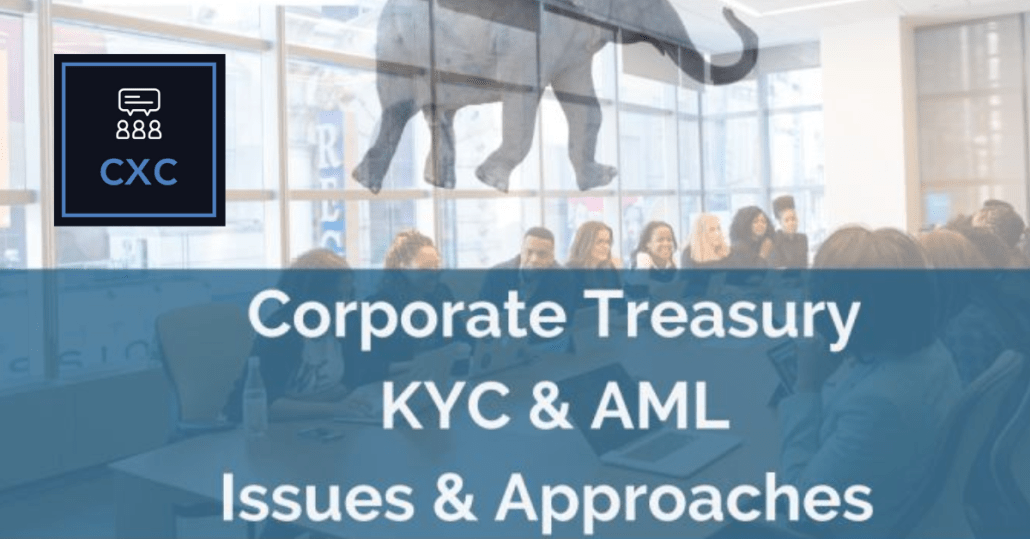Corporate Treasury KYC & AML Issues and Approaches
By ComplexCountries
07/12/2023
We all know there are two certainties in life: death and taxes. If you work in corporate treasury, it seems there is now a third certainty: KYC.

Can’t get enough? Check out these latest items
 https://treasuryxl.com/wp-content/uploads/2024/01/Template_VACANCY-featured.png
200
200
treasuryXL
https://treasuryxl.com/wp-content/uploads/2018/07/treasuryXL-logo-300x56.png
treasuryXL2026-01-16 07:00:102026-01-15 16:00:18Vacancy Ambitious Treasury Analyst – Rotterdam
https://treasuryxl.com/wp-content/uploads/2024/01/Template_VACANCY-featured.png
200
200
treasuryXL
https://treasuryxl.com/wp-content/uploads/2018/07/treasuryXL-logo-300x56.png
treasuryXL2026-01-16 07:00:102026-01-15 16:00:18Vacancy Ambitious Treasury Analyst – Rotterdam https://treasuryxl.com/wp-content/uploads/2026/01/SCFS26-logo_blue_200x200.png
833
833
treasuryXL
https://treasuryxl.com/wp-content/uploads/2018/07/treasuryXL-logo-300x56.png
treasuryXL2026-01-15 14:53:532026-01-15 16:01:3812th Supply Chain Finance Summit
https://treasuryxl.com/wp-content/uploads/2026/01/SCFS26-logo_blue_200x200.png
833
833
treasuryXL
https://treasuryxl.com/wp-content/uploads/2018/07/treasuryXL-logo-300x56.png
treasuryXL2026-01-15 14:53:532026-01-15 16:01:3812th Supply Chain Finance Summit https://treasuryxl.com/wp-content/uploads/2022/07/Coty.png
200
200
treasuryXL
https://treasuryxl.com/wp-content/uploads/2018/07/treasuryXL-logo-300x56.png
treasuryXL2026-01-15 13:45:042026-01-15 13:45:04Intern Commercial Finance @ Coty
https://treasuryxl.com/wp-content/uploads/2022/07/Coty.png
200
200
treasuryXL
https://treasuryxl.com/wp-content/uploads/2018/07/treasuryXL-logo-300x56.png
treasuryXL2026-01-15 13:45:042026-01-15 13:45:04Intern Commercial Finance @ Coty https://treasuryxl.com/wp-content/uploads/2025/11/FinanceKey-Featured.png
200
200
treasuryXL
https://treasuryxl.com/wp-content/uploads/2018/07/treasuryXL-logo-300x56.png
treasuryXL2026-01-15 08:18:112026-01-15 08:18:11Five ways real-time data saves finance teams time and money
https://treasuryxl.com/wp-content/uploads/2025/11/FinanceKey-Featured.png
200
200
treasuryXL
https://treasuryxl.com/wp-content/uploads/2018/07/treasuryXL-logo-300x56.png
treasuryXL2026-01-15 08:18:112026-01-15 08:18:11Five ways real-time data saves finance teams time and money https://treasuryxl.com/wp-content/uploads/2024/08/Aviva-BLOGS-featured-2.png
200
200
treasuryXL
https://treasuryxl.com/wp-content/uploads/2018/07/treasuryXL-logo-300x56.png
treasuryXL2026-01-14 08:46:212026-01-14 09:52:34Liquidity Outlook 2026
https://treasuryxl.com/wp-content/uploads/2024/08/Aviva-BLOGS-featured-2.png
200
200
treasuryXL
https://treasuryxl.com/wp-content/uploads/2018/07/treasuryXL-logo-300x56.png
treasuryXL2026-01-14 08:46:212026-01-14 09:52:34Liquidity Outlook 2026 https://treasuryxl.com/wp-content/uploads/2026/01/Monex-BLOGS-featured.png
200
200
treasuryXL
https://treasuryxl.com/wp-content/uploads/2018/07/treasuryXL-logo-300x56.png
treasuryXL2026-01-13 07:44:512026-01-13 07:46:14Monex 2026 Year-Ahead Outlook: FX Markets and Hedging Strategies
https://treasuryxl.com/wp-content/uploads/2026/01/Monex-BLOGS-featured.png
200
200
treasuryXL
https://treasuryxl.com/wp-content/uploads/2018/07/treasuryXL-logo-300x56.png
treasuryXL2026-01-13 07:44:512026-01-13 07:46:14Monex 2026 Year-Ahead Outlook: FX Markets and Hedging Strategies https://treasuryxl.com/wp-content/uploads/2024/10/Embat-BLOGS-featured-2.png
200
200
treasuryXL
https://treasuryxl.com/wp-content/uploads/2018/07/treasuryXL-logo-300x56.png
treasuryXL2026-01-12 07:00:432026-01-12 03:36:46Finance Automation Is Having Its Sourdough Starter Moment
https://treasuryxl.com/wp-content/uploads/2024/10/Embat-BLOGS-featured-2.png
200
200
treasuryXL
https://treasuryxl.com/wp-content/uploads/2018/07/treasuryXL-logo-300x56.png
treasuryXL2026-01-12 07:00:432026-01-12 03:36:46Finance Automation Is Having Its Sourdough Starter Moment https://treasuryxl.com/wp-content/uploads/2024/01/Template_VACANCY-featured.png
200
200
treasuryXL
https://treasuryxl.com/wp-content/uploads/2018/07/treasuryXL-logo-300x56.png
treasuryXL2026-01-09 07:00:142026-01-08 14:00:46Vacancy Business Treasurer – Tilburg Region
https://treasuryxl.com/wp-content/uploads/2024/01/Template_VACANCY-featured.png
200
200
treasuryXL
https://treasuryxl.com/wp-content/uploads/2018/07/treasuryXL-logo-300x56.png
treasuryXL2026-01-09 07:00:142026-01-08 14:00:46Vacancy Business Treasurer – Tilburg Region https://treasuryxl.com/wp-content/uploads/2024/10/Carlo-_BLOGS-Expert-featured-2.png
200
200
treasuryXL
https://treasuryxl.com/wp-content/uploads/2018/07/treasuryXL-logo-300x56.png
treasuryXL2026-01-08 08:57:102026-01-08 08:57:37SWIFT entering the blockchain world
https://treasuryxl.com/wp-content/uploads/2024/10/Carlo-_BLOGS-Expert-featured-2.png
200
200
treasuryXL
https://treasuryxl.com/wp-content/uploads/2018/07/treasuryXL-logo-300x56.png
treasuryXL2026-01-08 08:57:102026-01-08 08:57:37SWIFT entering the blockchain world



Like taxes, it seems you may be able to mitigate the problem – but you can’t eliminate it. All treasurers understand it has to be done: they are anxious to make it as painless as possible.
We did this peer call because KYC seems to be less prominent than before: it no longer seems to be headline material in the specialised press or at treasury conferences. Is this because the problem has been solved, or is it because treasurers are resigned to their fate, and have stopped complaining vocally?
The answer is very much the latter. This was, in fact, a very vocal call – and well attended. Disappointingly, most of the complaints are exactly the ones we recorded two years ago when we last discussed the topic. The discussion gives the impression that most banks have decided this is something where they can hide behind regulations and force their clients to comply, whatever the problems and cost – the full report is very informative. They do not appear to feel they have a duty to make compliance as low cost and painless as possible.
Unsurprisingly, this has led to the situation where KYC is now a criterion in bank evaluations: some participants are beginning to fire banks for being unreasonable. The problems are all too familiar:
So, what is the good news? There is some:
AML (Anti Money Laundering) was discussed, but it was less of an issue than previously. This may simply be due to a different set of participants, but it does seem that the treasury teams have become more adept at recognising in advance the kind of (entirely proper) transaction which is likely to set off AML alarms in banks, and get ahead of the issue. Constant sanctions screening for denied parties, coupled with regular employee training, have also helped.
Bottom line: on the one hand, it is disappointing to see that KYC continues to be a major source of workload and frustration for corporates. Going through the list of complaints – it is long – most banks have made little to no progress in how they handle it. There is only one conclusion: they do not see this as a major issue in their customer relationships, so they can continue to generate unreasonable demands, and do little or nothing to standardise requirements and depositories. Some major banks are even centralising KYC processing, with the effect – intentional or otherwise – that the process becomes even more rigid and inflexible.
On the other hand, a lot of corporates are becoming more professional in their approach. In addition to organising their own systems and repositories, they are becoming more structured in their pushback on new and unreasonable requests. For the first time, we heard clear indications that ease of doing KYC has become a factor in how banks are assessed – and bank relationships are being terminated for being too difficult to deal with.
It is only once banks feel that failure to address the issue will cost them business that the situation will improve.
JP Morgan was consistently praised for being willing to work with their clients to improve the situation – though their record was not 100%. BNPParibas were also mentioned as improving, Standard Chartered and Barclays received positive comments. Citi, HSBC and Santander were recorded as not being helpful, and not necessarily moving in a positive direction.
This report was produced by Monie Lindsey based on a Treasury Peer Call chaired by Rupert Keenlyside
To access this report
Access to the full report is available to Premium Subscribers of ComplexCountries. Please log in on the website of ComplexCountries to access the download.
Please contact ComplexCountries to find out about their subscription packages.